The AMD Ryzen Threadripper 1950X and 1920X Review: CPUs on Steroids
by Ian Cutress on August 10, 2017 9:00 AM ESTCPU Encoding Tests
One of the interesting elements on modern processors is encoding performance. This includes encryption/decryption, as well as video transcoding from one video format to another. In the encrypt/decrypt scenario, this remains pertinent to on-the-fly encryption of sensitive data - a process by which more modern devices are leaning to for software security. Video transcoding as a tool to adjust the quality, file size and resolution of a video file has boomed in recent years, such as providing the optimum video for devices before consumption, or for game streamers who are wanting to upload the output from their video camera in real-time. As we move into live 3D video, this task will only get more strenuous, and it turns out that the performance of certain algorithms is a function of the input/output of the content.
All of our benchmark results can also be found in our benchmark engine, Bench.
7-Zip 9.2: link
One of the freeware compression tools that offers good scaling performance between processors is 7-Zip. It runs under an open-source licence, is fast, and easy to use tool for power users. We run the benchmark mode via the command line for four loops and take the output score.
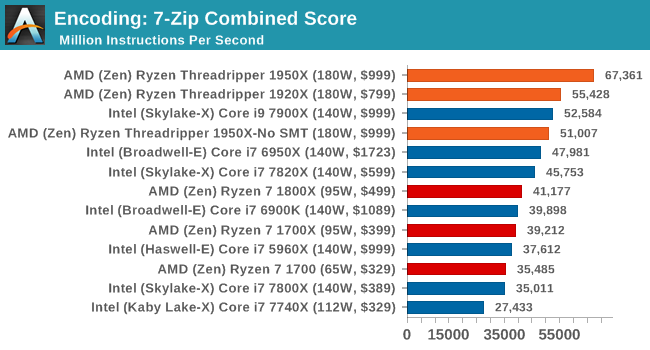
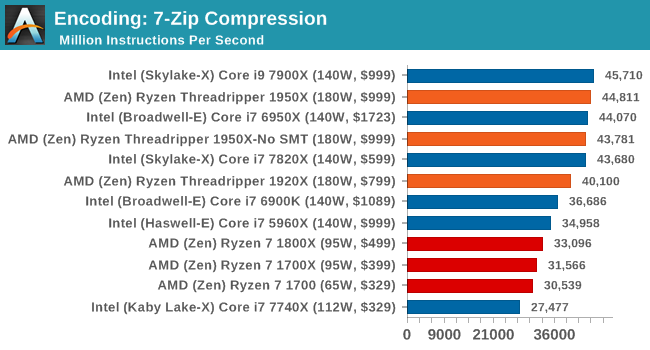
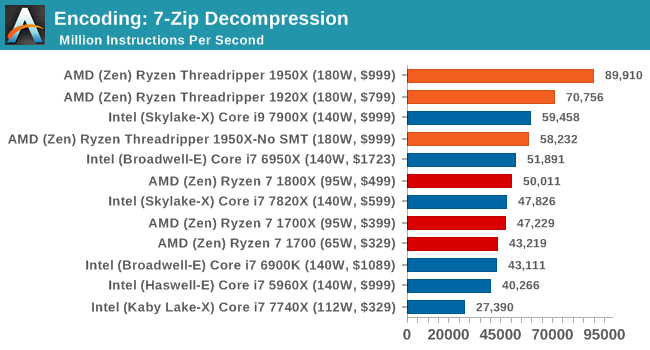
At the request of a few users, we've gone back through our saved benchmark data and pulled out compression/decompression numbers for 7-zip. AMD clearly makes a win here in decompression by a long way.
WinRAR 5.40: link
For the 2017 test suite, we move to the latest version of WinRAR in our compression test. WinRAR in some quarters is more user friendly that 7-Zip, hence its inclusion. Rather than use a benchmark mode as we did with 7-Zip, here we take a set of files representative of a generic stack (33 video files in 1.37 GB, 2834 smaller website files in 370 folders in 150 MB) of compressible and incompressible formats. The results shown are the time taken to encode the file. Due to DRAM caching, we run the test 10 times and take the average of the last five runs when the benchmark is in a steady state.
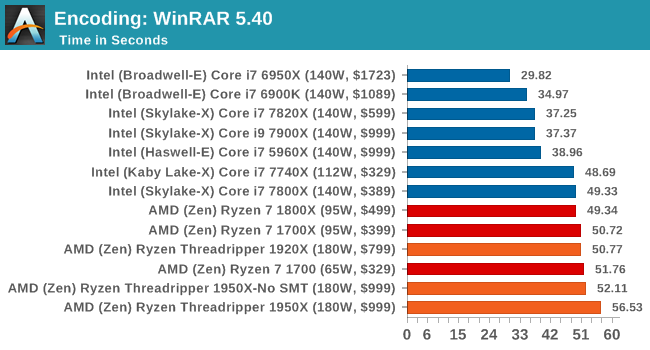
WinRAR encoding is another test that doesn't scale up especially well with thread counts. After only a few threads, most of its MT performance gains have been achieved. Which isn't a help to Threadripper, and is outright a hiderence in Creator Mode.
AES Encoding
Algorithms using AES coding have spread far and wide as a ubiquitous tool for encryption. Again, this is another CPU limited test, and modern CPUs have special AES pathways to accelerate their performance. We often see scaling in both frequency and cores with this benchmark. We use the latest version of TrueCrypt and run its benchmark mode over 1GB of in-DRAM data. Results shown are the GB/s average of encryption and decryption.
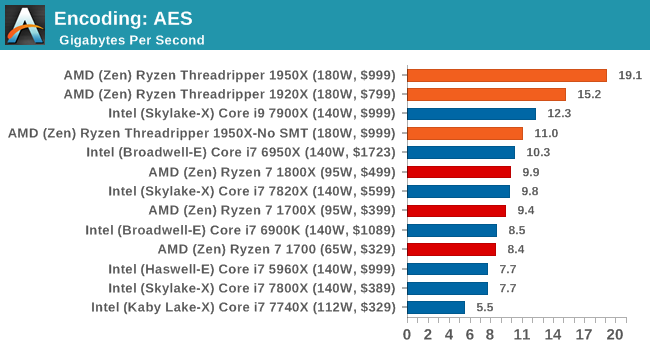
HandBrake v1.0.2 H264 and HEVC: link
As mentioned above, video transcoding (both encode and decode) is a hot topic in performance metrics as more and more content is being created. First consideration is the standard in which the video is encoded, which can be lossless or lossy, trade performance for file-size, trade quality for file-size, or all of the above can increase encoding rates to help accelerate decoding rates. Alongside Google's favorite codec, VP9, there are two others that are taking hold: H264, the older codec, is practically everywhere and is designed to be optimized for 1080p video, and HEVC (or H265) that is aimed to provide the same quality as H264 but at a lower file-size (or better quality for the same size). HEVC is important as 4K is streamed over the air, meaning less bits need to be transferred for the same quality content.
Handbrake is a favored tool for transcoding, and so our test regime takes care of three areas.
Low Quality/Resolution H264: Here we transcode a 640x266 H264 rip of a 2 hour film, and change the encoding from Main profile to High profile, using the very-fast preset.
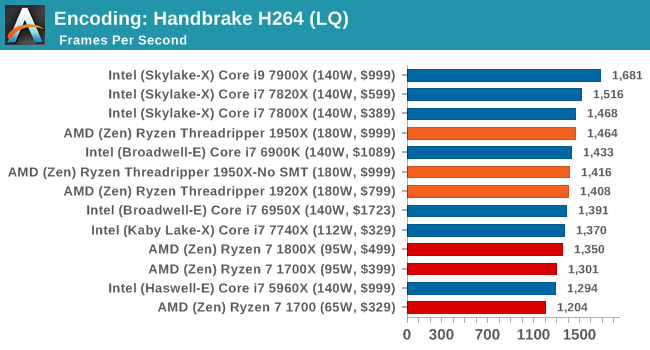
High Quality/Resolution H264: A similar test, but this time we take a ten-minute double 4K (3840x4320) file running at 60 Hz and transcode from Main to High, using the very-fast preset.
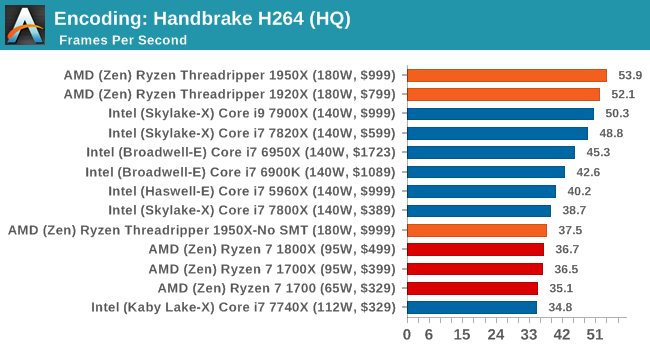
HEVC Test: Using the same video in HQ, we change the resolution and codec of the original video from 4K60 in H264 into 4K60 HEVC.
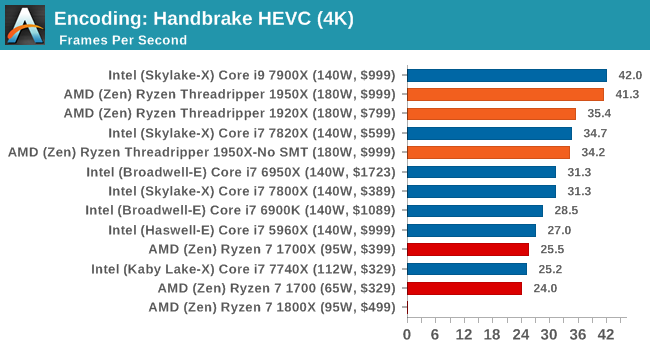
In the HQ H264 test, AMD pushes ahead with both the processors, while SMT-off severely limits the 1950X due to the lack of SMT threads. As we move to HEVC though, the 1950X and 7900X clash on performance.










347 Comments
View All Comments
Notmyusualid - Sunday, August 13, 2017 - link
Yep, I'll get the door for him.Jeff007245 - Friday, August 11, 2017 - link
I don't comment much (if ever), but I have to say one thing... I miss Anand's reviews. What happened to AnandTech?What ever happened to IPC testing when IPC used to be compared on a clock for clock basis? I remember the days when IPC used to be Instructions Per Clock, and this website and others would even use a downclock/overclock processors at a nominal clock rate to compare the performance of each processor's IPC. Hell, even Bulldozer with a high clock architecture was downclocked to compare is "relative IPC" in regards using a nominal clockrate.
And to add to what other's are saying about the bias in the review... Honestly, I have been feeling the same way for some time now. Must be because AnandTech is at the "MERCY" of their mother company Purch Media... When you are at the mercy of your advertisers, you have no choice but to bend the knee, or even worse, bend over and do as they say "or else"...
Thanks for taking the time in creating this review, but AnandTech to me is no longer AnandTech... What other's say is true, this place is only good for the Forums and the very technical community that is still sticking around.
fanofanand - Tuesday, August 15, 2017 - link
Downclocking and overclocking processors to replicate a different processor within the same family can lead to inaccurate results, as IPC can and does rely (at least to a degree) on cache size and structure. I get what you are saying, but I think Ian's work is pretty damn good.SloppyFloppy - Friday, August 11, 2017 - link
Why did you leave out the i9s from the gaming tests?Why didn't you include the 7700k when you include 1800x for gaming tests?
People want to know that if they buy a $1k 7900X or 1950X if it's not only great for media creation/compiling but also gaming.
silverblue - Friday, August 11, 2017 - link
Stated why at the bottom of page 1. Also, he used the 7740X, so there is little to no point in putting the 7700K.Lolimaster - Friday, August 11, 2017 - link
The 1950X is as good at gaming as the 1800X, OCed 1700, with many more cpu resource to toy with.Swp1996 - Friday, August 11, 2017 - link
Thats The Best Title I have ever seen ...😂😂😂😂🤣🤣🤣🤣🤣 Steroids 😂😂😂🤣🤣🤣🤣🤣🤣🤣corinthos - Friday, August 11, 2017 - link
in other words.. AMD Ryzen is still the best bet for most people, and the best value. 1700 OC'd all day!BillBear - Friday, August 11, 2017 - link
>Move on 10-15 years and we are now at the heart of the Core Wars: how many CPU cores with high IPC can you fit into a consumer processor? Up to today, the answer was 10, but now AMD is pushing the barrier to 16I don't personally think of Threadripper or parts like Broadwell-E as being consumer level parts.
For me, the parts most consumers use have been using for the last decade have been Intel parts with two cores or four cores at the high end.
It's been a long period of stagnation, with cutting power use on mobile parts being the area that saw the most attention and improvement.
James S - Friday, August 11, 2017 - link
Agree the HEDT platforms are not for the average consumer they are for enthusiasts, professional workstation usage, and some other niche uses.When the frequency war stopped and the IPC war started. We should have had the core competition 5-8 years back since IPC stagnated to a couple percent gains year on year.